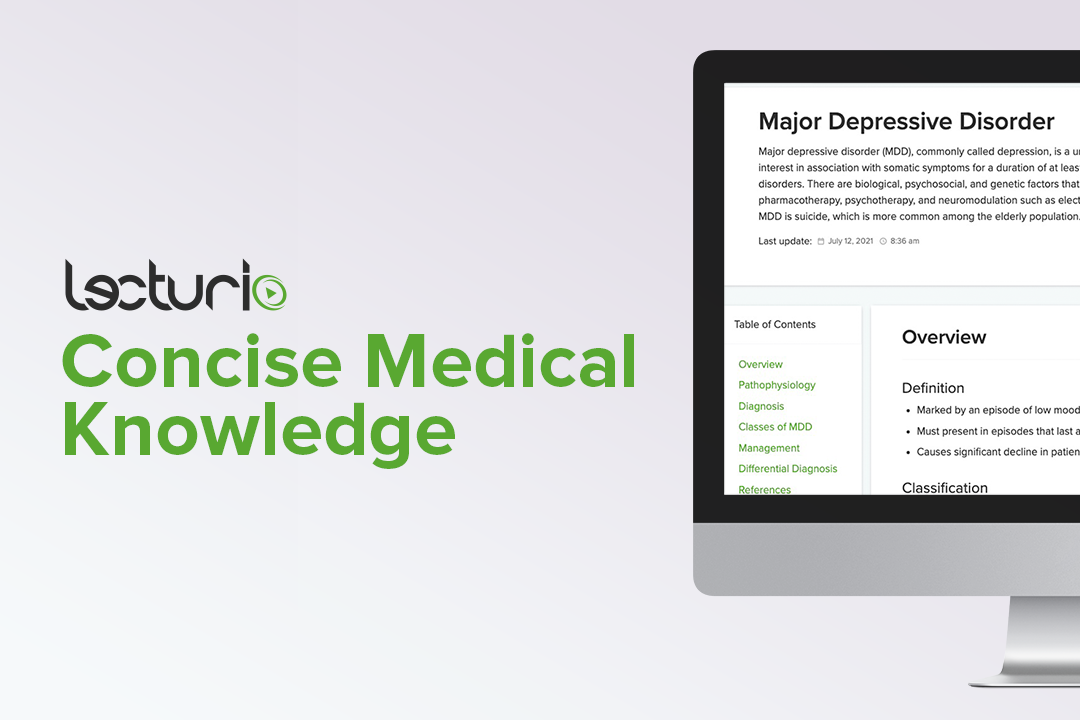Playlist
Show Playlist
Hide Playlist
Bipolar Disorder: Diagnosis and Major Depression
-
Slides Bipolar Psychiatry.pdf
-
Download Lecture Overview
00:01 There are a lot of criteria to diagnose bipolar disorder. 00:05 So I want to review that with you here because it’s really important. 00:08 So when you’re thinking about the diagnostic criteria for bipolar, you want to think about a distinct period of abnormally and persistently elevated expansive or irritable mood. 00:22 And abnormally and persistently increased activity or energy that lasts at least one week and is present most of the day for nearly everyday. 00:33 The patient meets that criteria, you’re going to more specifically dig to see if they meet three or more of the following criteria. 00:42 Now, if the patient has an elevated and persistently irritable mood, you’re going to look for four of the following criteria. 00:51 Grandiosity, which is an inflated self-esteem. 00:55 Maybe a patient coming in and saying to you, “Doctor, I’m going to be the next president. I ‘m going to be king.” So they have a very inflated sense of themselves. 01:05 Maybe they have a decreased need for sleep and they tell you, “You know, doctor, I haven’t slept in three nights and guess what, I don’t need to. I’m full of energy.” And usually patients tend to kind of like this symptom. 01:17 They may sound very pressured. 01:19 So this is where they don’t pause in between what they’re saying, but rather they go and on and they’re completely uninterruptible. 01:27 They have flight of ideas where their ideas are just – they’re sharing with them with you one after the other in rapid succession. 01:34 But they don’t necessarily link together all that well. 01:37 The patient may seem very distractible and they’re constantly having their attention drawn to something else in the room and they can’t stay focused on you. 01:46 They have increased goal-directed activity and a clinical example might be a patient who says to you, you know, “Doctor, I’m so busy lately. I’m training for a marathon. 01:58 I’m writing the next great American novel. 02:00 I’m staying up all night washing my house from room to room.” So they’re doing lots of things, but then they also tell you, “But you know, doctor, even though I’m doing all of these things, I’m not really getting any of it done, I just kind of start these projects and then they fall apart." And another symptom is impulsivity. 02:19 So a patient who’s taking on very reckless, impulsive acts. 02:24 This may be something like spending all of their money on a whole bunch of junk that they don’t need or speeding in their car or having a lot of sexual indiscretions that’s out of character with them. 02:36 Bipolar mania causes marked impairment in social and occupational functioning. 02:42 And it is not due to any other substance or general medical condition, very important things to keep in mind when you’re formulating your diagnosis. 02:53 Here is a really handy acronym to remembering the criteria and target symptoms of mania. 02:59 DIGFAST. 03:01 So keep this in mind. 03:02 The D is distractibility, insomnia, grandiosity, flight of ideas, activity or agitation, such as increased goal-directed activity, pressured speech and also thoughtless disregard of others. 03:20 So keep that in mind. 03:22 A manic episode is a psychiatric emergency because of severely impaired judgment, very important point. 03:31 We talked about hypomania earlier, so let me define it for you here. 03:35 This is a distinct period of abnormally and persistently elevated expansive or irritable mood and abnormally and persistently increased activity or energy lasting at least four consecutive days and present most of the day nearly every day. 03:55 So slightly different from a manic episode. 03:59 Unlike mania, hypomania episodes are not severe enough to cause marked impairment in social or occupational functioning. 04:10 So this is a very important point. 04:12 While mania involves this huge shifted mood where people get people get so elevated that it really impairs their lives. 04:20 Hypomania is a very small degree of that. 04:22 So life isn’t really being disrupted. 04:24 In fact, in clinical practice, most people will tell you that they enjoy their hypomanic episodes. 04:31 If during a period of elation and uncharacteristic behaviors, any psychotic symptoms are present, then by definition that episode is considered a manic episode. 04:43 So basically, a mood elevation with psychotic features is going to qualify for a mania as opposed to hypomania. 04:53 Sometimes people with bipolar disorder will have depressed episodes. 04:58 And I’m going to take an opportunity her to review with you the depressed symptoms and what that assessment looks like. 05:05 So patients here are going to meet five or more of the following target symptoms: Having a depressed mood, nearly every day, anhedonia, appetite or weight changes, sleep disturbance, whether it’s too much or too little. 05:20 Psychomotor agitation or retardation, loss of energy, feeling worthless or excessively guilty, trouble concentrating, and recurrent thoughts of suicide. 05:37 When it comes to bipolar major depression, symptoms cause a marked impairment in social and occupational functioning. 05:45 And of course, you must rule out that these symptoms are not due to general medical condition or substance use. 05:53 Here’s a quick mnemonic to remember, the major depressive target symptoms, SIGECAPS. 06:01 This is very helpful to keep in mind. 06:03 So sleep disturbance, loss of interest, guilt, energy changes, concentration changes, appetite alterations, psychomotor activity and also suicidal thoughts. 06:18 Major depressive episodes can be present in both bipolar I or bipolar II disorder. 06:24 In many patients will experience depression after the resolution of a manic episode. 06:33 When it comes to cyclothymic disorder, this is numerous periods of both hypomania and depression within a discrete timeframe. 06:43 Rapid cycling is another way to describe bipolar disorder and this includes four or more mood episodes during a 12-month period. 06:53 There are also seasonal patterns to bipolar disorder. 06:56 There can be a temporal relationship between shift in mood and the time of year. 07:02 And some common substances that can induce mania or look like a bipolar disorder are PCP or angel dust, cocaine, stimulants, and corticosteroids, along with SSRIs. 07:18 I said this earlier and it’s a really important point that antidepressants can actually unmask a manic episode. 07:24 So it’s very important in a patient whom you might think is very depressed to warn them and also observe them for any emerging signs of hypomania or mania once they start an antidepressant.
About the Lecture
The lecture Bipolar Disorder: Diagnosis and Major Depression by Helen Farrell, MD is from the course Mood Disorders. It contains the following chapters:
- Criteria for Bipolar
- Symptoms of Major Depression
Included Quiz Questions
Which of the following is NOT a diagnostic criterion for bipolar disorder?
- Low self-esteem
- Flight of ideas
- Impulsivity
- Increased distractibility
- Decreased need for sleep
What makes a manic episode a psychiatric emergency?
- It's a state of severely impaired judgment.
- The "flight of ideas" symptom
- It can last up to a week.
- The patient's inflated ego
- The presence of insomnia
Which of the following best defines rapid cycling disorder?
- 4 or more mood episodes in 12 months
- 6 or more mood episodes in 12 weeks
- Occurrence of depression every year during winter
- Numerous episodes of hypomania in a discrete time frame
- Absence of mood symptoms for 4 or more months in 12 months
Customer reviews
5,0 of 5 stars
| 5 Stars |
|
5 |
| 4 Stars |
|
0 |
| 3 Stars |
|
0 |
| 2 Stars |
|
0 |
| 1 Star |
|
0 |





